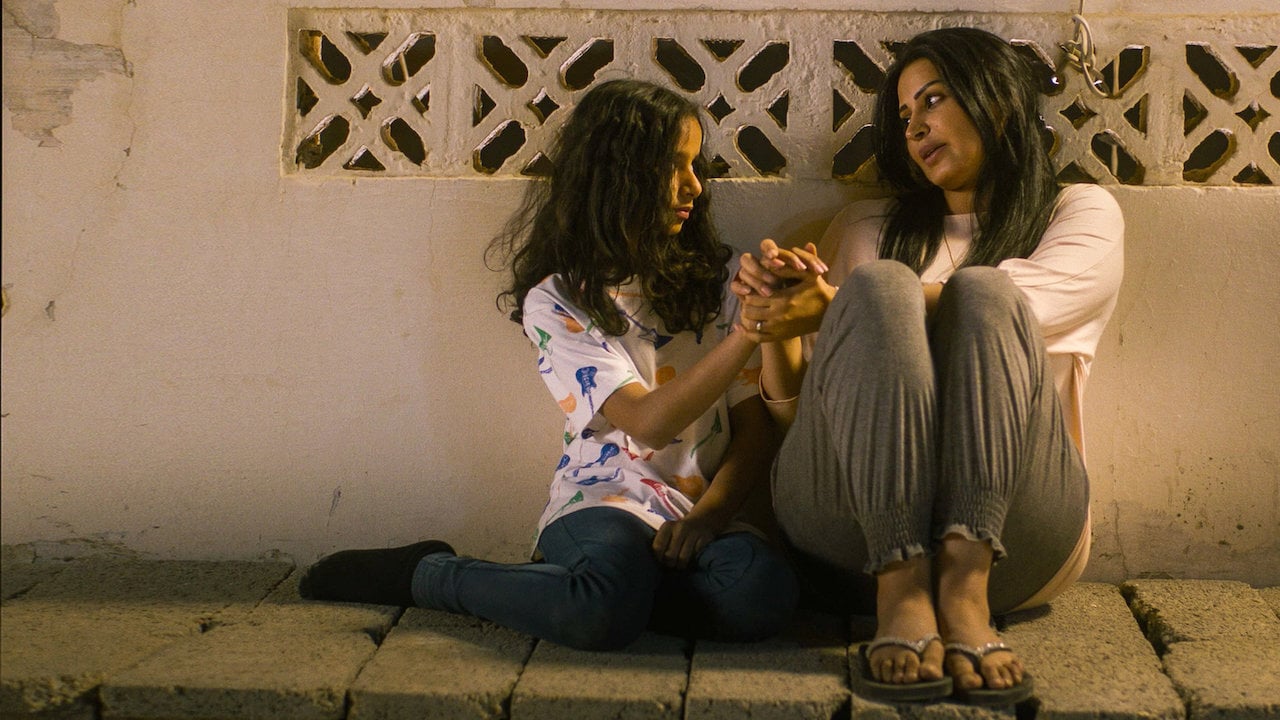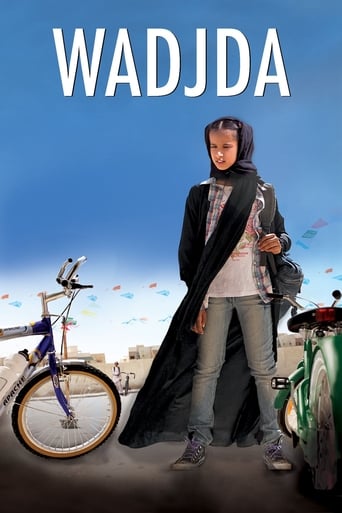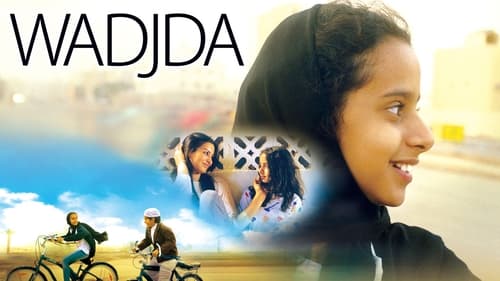



I like the storyline of this show,it attract me so much
View MoreFantastic!
This is one of the few movies I've ever seen where the whole audience broke into spontaneous, loud applause a third of the way in.
View MoreIt's the kind of movie you'll want to see a second time with someone who hasn't seen it yet, to remember what it was like to watch it for the first time.
View MoreI don't really believe in giving films points; credit or positive reviews on the shallow basis that they merely are what they are. "Wadjda" is the first feature film shot entirely in Saudi Arabia - not only this, but is the first feature-length film made by a female Saudi director AND revolves entirely around the world of a little girl. This is quite something for a nation which, until recently, had both banned cinemas and are rather strident in what they permit their female population to do. The sheer fact that "Wadjda" even exists has thus led to the likes of John Hartl, of the Seattle Times, to say it deserves praise "...just for being what it is", but this is not a philosophy I find myself being able to subscribe to. I think it right to say that similar cries of acclaim were directed towards "Osama" in 2003, which was one of only a handful of films the nation of Afghanistan had ever made and was, I believe, the first to be produced in a post-Taliban era. Subjectivity, however, must always triumph.If "Wadjda" deserves any credit for anything at all, then it is for the fact that it is a damn fine impressive piece of film-making in its own respect. It is so competent, in fact, that watching it and researching the facts afterwards causes you to wonder if anything that you are reading about the strictness of film-making in Saudi Arabia even existed at all. Indeed, by the looks of things, their citizenry are as cine-literate as anyone else and are more than aware of how to put together a solid piece of drama film-making."Wadjda" revolves around a young girl played by Waad Mohammed, who is the Wadjda of the title. She lives in Riyadh with her mother and father; attends school and enjoys messing around with a boy named Abdullah (Abdullrahman Algohani). Wadjda is a bit of a rebel: she is bored by prayer recitation at school and wears trainers where everyone else dons more formal looking footwear. At home, she records pop music off the radio and dances to it in her room - because we're all experts in Middle Eastern cinema, we know from seeing 2009's "Afghan Star" that it is illegal for women to dance because one of the contestants in said documentary landed themselves in some serious trouble when she momentarily did such a thing. She has a streak of wit to her: "I'm too good looking to be related to you" she quips to a shop-keeper before haggling with him. The bulk of the film will go on to consist of a lust Wadjda has for a bicycle she cannot afford and will not have bought for her - a solution, however, arrives in the form of a Quran recital competition which comes with a cash prize. The exchanges between the characters throughout feel very real - this is seemingly a film about fictitious people in a given situation, of course, but it is also a film depicting a kind of liberation from being unable to act in front of a camera for the purposes of film-making. Both the editing and camerawork additionally do well to place you on the dusty streets of Riyadh. Al Mansour decides to take the opportunity of being the first woman to make a Saudi Arabian film in order to go down the route of a kind of progressivism - "Wadjda" is not a film particularly eager to make the case for the status quo, but it is not an especially aggressive film which stamps its feet for the cause of social change. Much of this, I think, is down to the fact the film is about children and a child - more specifically, a child who rebels. A film about an adult woman causing trouble, or mischief, may have been at once less subtle and harmed its chances of getting made. Moreover, Al Mansour appears to use the film as an opportunity to address the issues dominating contemporary politics in Saudi Arabia, but does so in such a way that is not preachy and assumes the viewer know nothing of Saudi society. I was unsure, for example, if the scene whereby Wadja's mother spends a good deal of time on screen in her own home uncovered, before covering her head with a burka in order so that her taxi driver will not see her face, was meant to be comedic or not: will Muslim men watching the film not see her anyway as she stands, on screen, before she covers up? Irrespective, if at first we were unsure of how men and women interact with one another in this place, we are certain when Wadjda's teacher outlines that a woman's voice is her "nakedness" if a man hears her speak. Best, therefore, to keep silent whenever possible.Wadjda's desire for a bicycle derives from seeing several boys riding bikes and her thinking it looks like quite good fun. The bike, therefore, comes to epitomise a sense of evenness. In conjunction with this, the director additionally depicts the otherwise harmless friendship between Wadjda and Abdullah - two foils otherwise spending the entire film at one another's throats but destined, we feel, to remain together for the rest of their lives. What kind of marriage they forge between them, and what role Wadjda might have in fulfilling the position of the wife, is perhaps uncertain: we sense Al Mansour hopes it will be different to what the reality might be if the film had been made forty years earlier.
View MoreWadjda is the story of a little girl living in Saudi Arabia. One day, a boy rides by her on his bike and she chases after him only for him to tease her and say "Catch me if you can." After this, all she wants is a brand new green bicycle that she sees for sale on her way home. The main reason she wants the bike is so she can race the boy that teased her, Abdullah, and beat him. When she asked her mom about buying a bike, she says no and that women don't ride bikes. Wadjda does not care what other people think and begins trying to save up money to purchase the bike. Eventually, Wadjda enters into a school Koran recitation contest to win the prize money and buy a bike. She spends a lot of time preparing for this competition and eventually wins the prize money. When she tells everyone she is going to buy a bike, the school then donates the money instead of giving it to Wadjda. At the very end of the film Wadjda is very sad that she can't purchase her bike. For the happy ending, Wadjda's mom buys her a bike and she beats Abdullah in a race. Overall I really enjoyed this film and thought that the simple story about a girl wanting a bike used to express women's rights is really well thought out and beautiful.
View MoreWadja is a very interesting film that really opens the world up to Saudi Arabia on gender roles. Due to Culture and religion, as well as the Taliban, Saudi Arabia faced Sharia Law, which caused all of the gender inequality issues there is today. Wadja focuses on a young girl who is still in grade school and pursues a certain bike she has had her eye on even since she first sees it. She does everything she can to earn enough money for the bike and even gets the store clerk to hold the bike for her in his shop. Throughout the entire storyline, there were the never-ending hints at all of the gender inequality. A few I can think of right now are the differences between life at home and life outside of the home between the mother and the daughter. First of all, when Wadja and her mother are by themselves at home they are happy, and they are who they truly are and express themselves that way, but as soon as they step outside of the front doors to the house it all changes. Wadja is young and more of a courageous rebel, but her mother puts the veil on and applies herself to every other expected gender role in Saudi Arabia's society. Lastly, before or after watching this film, I recommend doing research on how the director had to complete this film when it came to directing and everything else while in Saudi Arabia.
View MoreThere is no way to overstate how a simple story, taken out of life - the life of a Saudi girl - can be so inspiring. There are so many small heroes in this film, along with the more distasteful elements of any society. You can't forget little Wadjda who has no innate reverence for silly rules, almost naïvely turning the overbearing form of Saudi Islam on itself, her mother, as much a victim of life as any other, eventually growing out of her own distress and taking a step to giving her daughter the liberty she never had, the shop-keeper, who tacitly roots for little Wdjda, and of course, Wadjda's little pal, who, born to be an alpha in Saudi society, glows with joy to see his friend - one he cares for - break a little bit freer, teaching her to ride a bike. He himself has no innate need to be the alpha, and is just happy for her. All these people together deal a small blow to the ills of their society, which are indirectly ridiculed, through the hypocrisy and self-interest of their servants. And when this movie is done, you'll know how a bike could be a symbol! Enjoy!
View More